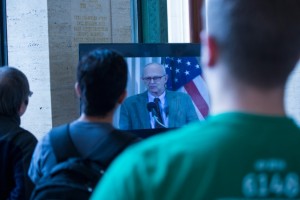Celebrating LIGO: MIT Helps Prove Einstein Right
-
-
slice.mit.edu
Filed Under
Recommended

Last week’s blockbuster announcement of the first direct observation of gravitational waves, which were proposed in Einstein’s theory of relatively, got lots of people googling for definitions and insight. If you would like to know more about this new glimpse into the workings of the universe hailing from 1.3 billion light years away, tune in to Monday’s webcast with two alumni who work on the Laser Interferometer Gravitational-Wave Observatory (LIGO) project, a multi-decade collaboration led by MIT and Caltech.
During Celebrating LIGO, an episode of the free Faculty Forum Online: Alumni Edition series, you can hear CalTech research physicist Joseph Betzwieser PhD '08 and Stanford senior research scientist Brian Lantz '92, PhD '99 and other alumni describe their work, detail the significance of the breakthrough, and answer questions from fellow alumni.
Register now for Celebrating LIGO to receive a link Monday morning to tune in and ask your questions on Feb. 22, 4:00–4:45 p.m.
The LIGO news was big at MIT, in part, because MIT operates one of the two LIGO facilities and because Rainer Weiss ’55, PhD ‘62, a MIT professor emeritus of physics, has been described as an instigator of the project. Read the MIT News article to learn about the history of the global collaboration and watch the MIT press conference with President L. Rafael Reif and faculty experts.
In “The dividends of investing in science,” a Boston Globe op-ed published Tuesday, President Reif praised the role of the National Science Foundation for its insight and courage in funding such a substantial basic research project. “Without basic science, our best guess never gets any better, and ‘innovation’ is tinkering around the edges. With the advance of basic science, society advances too,” he wrote.
What’s Up Next?
Tomorrow’s Webcast: Should We Go to Mars?
Alumni researchers from University of Illinois, University College London, and Cornell University share their perspectives on the next century of crewed space missions, moderated by Wade Roush PhD '94 of the MIT Program in Science, Technology, and Society. Register now for the free webcast: February 19, Noon–12:45 p.m. EST.







